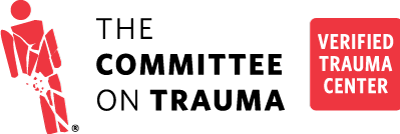How are the Emergency Department and Trauma Center Different?
Our Emergency Department provides care for a variety of conditions, including heart attacks, strokes, stomach pain, sprains, and strains.
Our Trauma Care team specializes in treating patients with immediate life-threatening or very serious injuries. Our Level II verification demonstrates our ability and commitment to go beyond initial treatment and ensure high-quality care for trauma patients from arrival to recovery.

Conditions We Treat
- Amputations, cuts, puncture wounds
- Fractures
- Facial trauma
- Gunshot wounds
- Injuries from serious falls or vehicle crashes
- Traumatic brain injuries
- Spinal cord injuries
What is a Level II Trauma Center?
The ACS classifies trauma centers into five levels (I, II, III, IV, and V) based on their available resources and the number of patients they treat each year. As a Level II trauma center, Stormont Vail consistently provides:
Immediate Care from Multiple Specialists
Our Level II Trauma Center provides around-the-clock care from a diverse team of specialists. This includes general surgeons and experts in various fields, such as orthopedic surgery, where we focus on injuries related to the pelvis, hands, feet, and ankles. Other specialties include neurosurgery, anesthesiology, emergency medicine, interventional radiology, cardiothoracic surgery, ophthalmology, ear, nose, and throat surgery, plastic surgery, urology, obstetrics/gynecologic surgery, and critical care.
Trauma Education and Prevention
Our Trauma Care team provides more than just emergency trauma services. We offer public resources and workshops tailored for various age groups to educate the community about trauma prevention and strategies for avoiding common causes of injuries. Additionally, we regularly conduct continuing education programs for prehospital and hospital professionals.
Quality Care
During daily trauma rounds, our multidisciplinary care team assesses the condition of each patient admitted with serious injuries, ensuring coordinated and comprehensive care. Our Trauma Program team also reviews the records of more than 3,000 trauma patients annually. We track and analyze data to continuously enhance our processes, ensuring we deliver our patients the best possible care.
Hospital Accommodations for Patients
When patients need hospitalization, we place them in the best unit for their specific injury. From there, our medical team provides care and notifies loved ones of the patient's condition and location. Based on the patient's status, we may transfer them to different areas, including:
Resources for Trauma Survivors and their Caregivers
Dealing with a traumatic injury can be scary and confusing. Getting medical care, seeking resources, and navigating recovery can be overwhelming. Knowing that you’re not alone is essential. We're here to support you every step of the way. As a member hospital of the Trauma Survivors Network, we provide community for survivors and their families to connect and rebuild after a traumatic physical injury. Explore our Trauma Workbook and download it to save and share.
